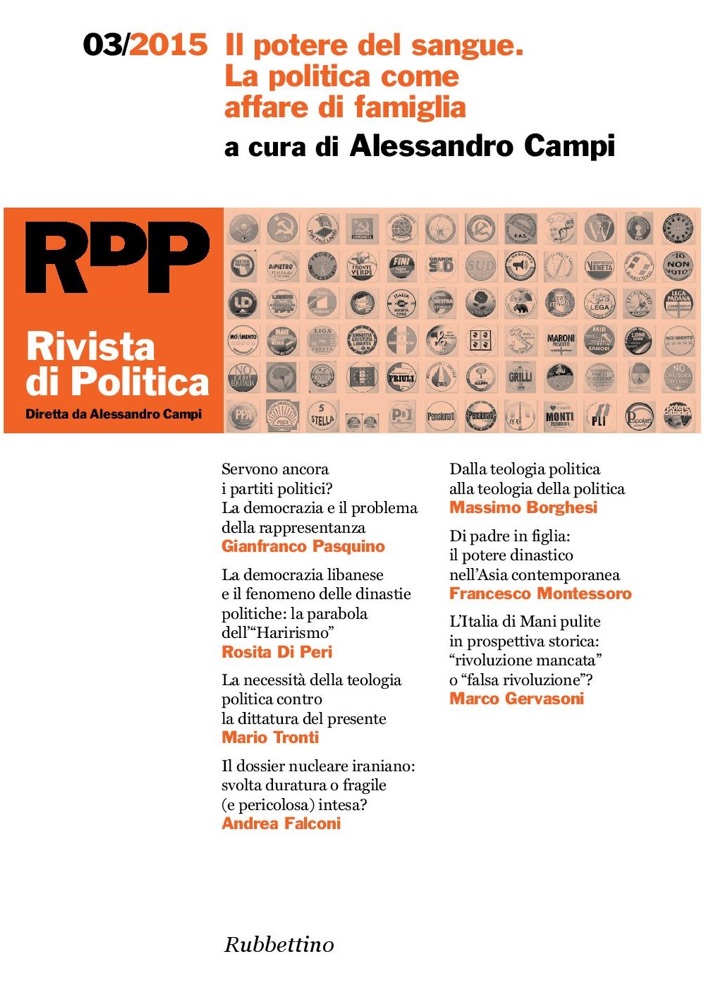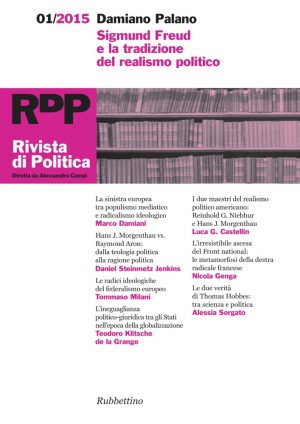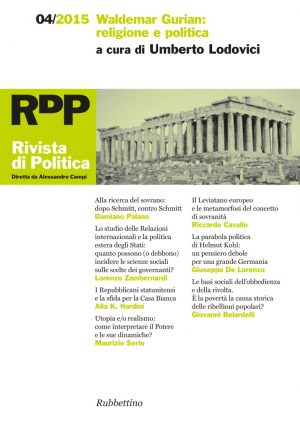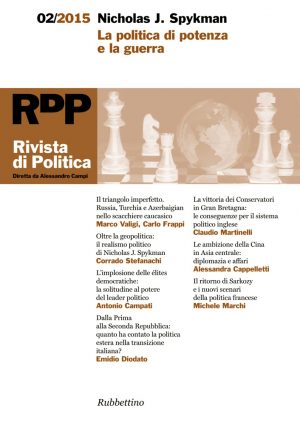03/2015 – Il potere del sangue. La politica come affare di famiglia. A cura di Alessandro Campi
ISSN: 2037-495X
8,50€ – 11,00€
Descrizione
Sommario:
congetture e confutazioni
Tangentopoli in prospettiva storica (con l’aiuto della fiction) Marco Gervasoni
Perché i partiti servono ancora Gianfranco Pasquino
L’intermezzo iraniano: i nuovi paradigmi della geopolitica di Teheran Andrea Falconi
il potere del sangue. la politica come affare di famiglia
Le dinastie politiche e il futuro della democrazia Alessandro Campi
Di padre in figlia. Leadership femminili in Asia Francesco Montessoro
L’“Harirismo” in Libano: ascesa e declino di un fenomeno socio-politico Rosita Di Peri
Democrazie dinastiche: la famiglia Nehru-Gandhi e la costruzione della democrazia in India Fabio Leone
Casate e politica dell’Iraq post-Saddam: il ruolo degli alidi nell’exclusive élite bargain Raffaele Mauriello
Potere genera potere: la dinastia politica di Gibuti Federica Guazzini
dossier: teologia politica o teologia della politica?
Il conflitto politico-religioso e l’attualità della teologia politica Massimo Borghesi
Teologia politica contro la dittatura del presente Mario Tronti
L’incontro con Del Noce in una ricerca marxista. Marxismo, teologia politica, filosofia della trascendenza Pasquale Serra
Sturzo: religione, società, politica Giovanni Dessì
Sub specie aeternitatis. La teologia della politica di Reinhold Niebuhr Luca G. Castellin
Il lungo addio. Su due modalità di congedo dalla teologia politica Antonio Allegra
Teologia politica. Bibliografia italiana: 2001-2015 Marco Pacioni
Abstracts
Francesco Montessoro, From father to daughter. Female leadership in Asia
In the academic world only a few authors have paid attention to the topic of female leadership in Asia, where, since the second half of the XX century, many women have held key positions at the top of the State. Indeed, at least 14 women came to prominence as presidents, prime ministers or party leaders in countries of different political, social and cultural background, and among them even Muslims countries like Pakistan, Bangladesh, Indonesia and Malaysia. The main features of these leaderships are the dynastic background and the condition of widows, daughter or wives of charismatic (and dead) male politicians of which these women have inherited the party machine and the personal charisma. Case studies are Burma’s Aung San Suu Kyi and Indonesia’s Megawati Sukarnoputri.
Rosita Di Peri, The ‘Harirism’ in Lebanon: rise and decline of a social-political phenomenon
Rafiq Hariri, an emblematic but highly controversial figure in Lebanon, was the pivot of a new political phenomenon, the ‘Harirism’. In a relative short period of time Hariri was able to create a financial and political empire mostly based upon his familiar network. This process was completed in the frame of the Sunni community, the belonging community of Hariri, through a process of ‘Harirification’ of Sunnism. After the Hariri’s assassination in 2005 was the Hariri dynasty, especially in the figure of Saad Hariri-son of Rafiq, able to keep alive the Harirism? This paper aims to reflect upon the Harirism and the Sunnism in Lebanon, especially after the outbreak of the Syrian crisis in 2011.
Fabio Leone, Democratic Dynasties in India. The Nerhu-Gandhi family and the building of India’s Democracy
The political dynasties are present in many countries and in different political systems. This phenomenon is very common in India. There are many unresolved issues relating to this phenomenon. The political dynasties phenomenon has been often criticized end pointed out as an archaic and pre-modern phenomenon: a real obstacle to political and economic development of the countries. Nevertheless, India has been and it is a real and working democracy. Moreover the literature on political dynasties has said surprisingly little about their role and influence on democratization processes. This work is an attempt to address these issues using the Nehru-Gandhi family and its role on the Indian democratization process as case study.
Raffaele Mauriello, Lineage and Politics in Post-Saddam Iraq: Alids’ Role in the ‘Exclusive Elite Bargain’
Republican Post-Baathist Iraq witnesses the formation of political dynasties of Alid Shi‘i families. This essay examines the role of these families in the current Iraqi political scene. It analyses some eminent families: al-Sadr, al-Hakim, and Bahr al-Ulum. These Alid families play a key role within the ‘exclusive elite bargain’ that, according to a hypothesis advanced by Dodge in Iraq from War to a New Authoritarianism (2012), characterizes political dynamics in post-Saddam Iraq.
The Alids represent the elite par excellence of the Islamic civilization. They claim to descent from the Prophet Muhammad. Outside Muslim societies, this elite is largely unknown to the general public. However, the political authority of the Moroccan and Jordanian (Sunni) monarchies is relevantly based on claiming this descent. Lesser known is the role of some Alid Shi‘i families in Arab (and more generally Muslim) countries with a republican tradition – although one regularly marked by authoritarianism –, such as Iraq.
Euro-American academy has for many decades overlooked the study of the role of family in contemporary politics. This has been the case not only of the study of politics in Europe and North America, but even of the Near East, where the persistence of the anthropological element in society, politics, and economy has remained more evident. In fact, human societies have always invested the family with sacred significance. The household, the expression in domestic space of the family, has always been taken as a model for moral and social order.
This study tries to overcome this shortcoming of Euro-American academy in the case of Near Eastern countries with a strong Shi‘i presence. The essay follows the methodological approach put forward by Eickelman and Piscatori in Muslim Politics (2004); i.e. a methodology based on an interdisciplinary approach between anthropology and political science. This approach is moreover integrated with analytical instruments offered by the Islamic Studies.
Federica Guazzini, Power breeds power: Djibouti’s political dynasty
Across sub-Saharan Africa, democracies are emerging following the progress made in the institutional reforms from 1990. Within this trend, the article takes a closer look at the role and meaning of African political dynasties for the development of democracy. Following a preliminary assessment, aimed at addressing under which circumstances political dynasties are tacking root becoming a rather permanent feature in a number of African countries, the article highlights the case-studies of inter-familiar successions by electoral competitions, claimed to be free and fair. As regular elections often couple with a reality of democratic rollback and hybrid regimes, the article argues that democracy promotion itself may become instrumental in creating political dynasties. In order to complement ongoing current empirical research, the article focus on Djibouti. Tracing the topography of power of this political dynasty, the article examines how the manipulation of the politics of belonging and the neo-patrimonial exploitation of the country’s non-tangible resources (geo-strategic location and aid-inspiring poverty) have reinforced the concentration and consolidation of public offices and political power by persons related to one another and to the family of the elected head of State.
Mario Tronti, Political Theology vs dictatorship of our time
Why political theology still today? Because it is a possible path towards regaining a thought of freedom: not freedom from nor freedom to, but freedom for. Freedom for ‘messing up’ the world as ordered by the supremacy of democracy. Political theology, still today, also because it is an updated form of political realism. The critique of ideology is more relevant than ever; and acknowledging the present state of things, with lucidity and without illusions, is an intellectual move that cannot be sidestepped.
Pasquale Serra, The meeting with Del Noce in a Marxist research. Marxism, political theology, philosophy of transcendence
In this paper – considered by the author both an assessment of his own intellectual path and an interpretation of the Italian political and cultural history in the last fifty years – Augusto Del Noce’s philosophy is compared to Marxist research. The author aims not only to understand the origins and meaning of the dissolution of Marxist research, but also to help to restore all its analytical and critical potential. The issue ultimately under discussion in this paper is the philosophy of Marxism, including Marx’s philosophy itself. It is, indeed, in the redefinition of the relationship between marxism and philosophy that the author identifies a new research direction.
Giovanni Dessì, Sturzo: religion, society, and politics
Luigi Sturzo was a catholic priest who founded PPI (Italian Popular Party) in 1919: this party expressed the ideas of many catholic citizens. The PPI was neither a religious party nor a secular party. This essays analyses the Sturzo’s intellectual development from a radical opposition to Italian national state, a secular state, to the creation of a national party. PPI has been very important in Italian history because it has allowed to catholic citizens to offer their contribution to national politics.
In his books Sturzo works out on a realist approach to politics and state. The point was the detachment between religious ideas and political institutions, defining it as a dualism. On the other side he stated that the nature of man was the same as in religions as in politics: for this reason he spoke about monism.
From this point of view he wrote about the necessity of a public sphere in which religious ideas can be compared with secular ones, the dualism compared with monism in a democratic ways.
Luca G. Castellin, Sub specie aeternitatis. The Reinhold Niebuhr’s Theology of Politics
In the twentieth century Reinhold Niebuhr was an important public theologian who influenced the American culture and politics in depth. From the Thirties till the Sixties he wrote several historical, theological and political works, and was also a tireless polemicist and editor of some journals. Furthermore he developed a political philosophy, called Christian realism, which was a criticism of political theology, both as a formula of secularization and as a moment of politicization of the sacred or theologizing of politics. This article analyzes Niebuhr’s work with the aim of highlighting how his Christian realism was and continues to be a form of theology of politics. In other words, it was an expression of a liberal, democratic and pragmatic political theory in which the legacy of St. Augustine’s thought was very strong. In this perspective, we will proceed to the study of two characteristic aspects of his reflection in which the theological-political moment assumes a crucial importance. The first is the exposure of his democratic theory, while the second is the analysis of the US role in the Cold War.
Antonio Allegra, The Long Farewell. On Two Modes of Dismissing Political Theology
Since “political theology” is an expression that can be interpreted in many ways, even the farewells to this tradition of thought can have various motivations. The article examines the two major works written in Italian in recent years on the subject, by Roberto Esposito and Massimo Borghesi. Both show a critical standpoint, which illustrates, nevertheless, their fundamental diversity. This is derived, among other reasons, from their different stance to the notion of person. The outcome is a general reflection on the continuing relevance, at least to some extent, of the political theology itself.






